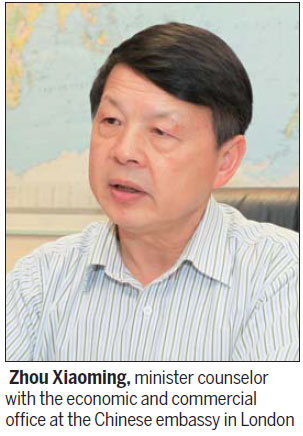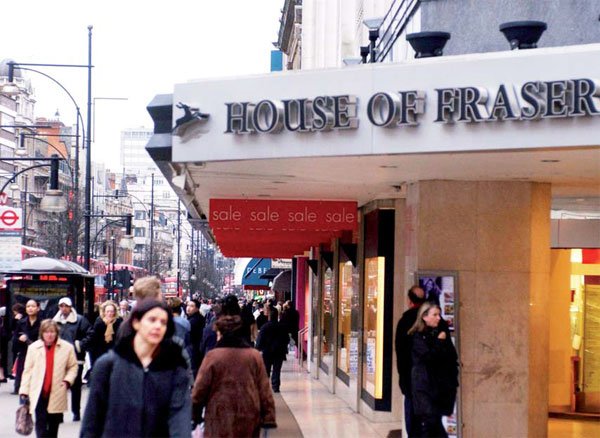An envoy who is happy to beat the drum

| The 165-year-old British department store House of Fraser was bought by China's Sanpower Group Ltd for 480 million pounds. Provided to China Daily |
Minister counselor in London is in the thick of it as China and Britain do business
Zhou Xiaoming considers himself lucky to have been able to observe and take part in the tremendous growth of Sino-British trade and investment over the past few years.
When he became minister counselor with the economic and commercial office at the Chinese embassy in London, he recalls, an important part of his daily job was to explain to businesses why China was an important market and commercial partner.
"These days there is no need to do that because many British companies understand the significance of the opportunities perhaps just as well as I do," says Zhou, sitting in his spacious central London office near Hyde Park.
"Now I talk to them about strategy, selecting the right partner and having the right product, and all other real business stuff."
Last year bilateral trade between China and Britain was worth $70 billion (50 billion euros), 11 percent higher than the year before. Over the same period, bilateral trade between China and Germany rose 3 percent, with Italy 3.9 percent and with the Netherlands 3.8 percent.
China's investments and acquisitions in Britain last year were worth more than $3 billion, with big deals involving well-known brands, infrastructure, media, research and property development.
Recent investments have included $2 billion by the developer Greenland in two London property projects, ZhongRong Group's 500 million pound ($840 million; 607 million euros) plans to redevelop Crystal Palace, and Sanpower's 480 million pound purchase of a majority stake in the department store chain House of Fraser.
In addition to this frenetic business activity, political relations between Britain and China have warmed considerably, British Prime Minister David Cameron having visited China with a delegation of more than 100 British companies in December.
That warm political relationship in particular has given Zhou and his staff a lot of work this year.

"Four months into 2014, I've already received many Chinese delegations visiting the UK. They're not just here to look for opportunities; they each have concrete deals to negotiate."
Zhou says he has also received many invitations from British businesses for visits and talks about opportunities in China, and over the past six months he has traveled to Cornwall, Nottingham, Bristol, Lincoln and Cambridge, among other places to meet local businesses.
He marvels at the hospitality he is accorded. "When I was in Lincoln, the mayor hosted a formal dinner in the town hall and made us feel like very important guests. I was very touched."
He talks of a visit to Flintshire, Wales, a year ago, an occasion at which the local council hoisted the Chinese flag high outside its offices.
"It was apparently the first time our flag had been flown there. I felt so proud."
On some of those trips, Zhou has met as many as 300 local businesses and spoken to more than 1,000 people. He has done more than two dozen such trips over the past four years, he says.
He is not shy about beating the drum as he talks about his role in promoting China-UK business relations, and he quotes the chairman of the China-Britain Business Council as once saying that "Zhou is the greatest salesman for Britain to China".
"Perhaps some prejudices underlie my fondness for the UK as a good place for Chinese companies. I am, after all, the minister counselor. But I sincerely believe there are many unique opportunities for collaboration."
One complementary aspect between the economies is Britain's innovation and China's capital and market, he says, which can achieve great things together for both.
"British people are very innovative, and they come up with amazing designs. Those ideas and designs can potentially be commercialized, produced and sold on a large scale to bring down cost to generate great profit.
"However, very often British companies do not have the capital to invest in this commercialization, and Britain's market is insufficient to accommodate increased production. But China has both capital and market."
Zhou says a good example of Chinese investment and its market supporting British technology is the purchase by the Chinese company Zhuzhou CSR Times Electric of British company Dynex Semiconductor Ltd, of Lincolnshire, which specializes in a particular type of semiconductor technology.
In 2008, Zhuzhou CSR Times Electric bought a 75 percent share in Dynex and retained Dynex's management board.
With financial support from Zhuzhou CSR Times Electric, Dynex built a 12 million pound R&D center to focus on developing its semiconductor technology. Dynex's R&D team also increased from 12 to about 40, including those from the Zhuzhou company on secondment.
"I went to Dynex in Lincolnshire and met the company's management team, which consisted mostly of British people who have worked at the company for years," Zhou says. "They are very excited about working with the Chinese owners, and they say Chinese investment has injected new life into the company."
So impressed is Zhou with Dynex's growth model that he has been promoting such cooperation to many British businesses.
Last month he visited a few agricultural equipment companies, including the planting equipment firm Standen and weed control equipment firm Garford Farm Machinery, and suggested letting Chinese companies into their businesses as equity partners as an option for expansion.
"The agricultural equipment companies I visited are very innovative in their products and efficient in their daily operations," Zhou says.
"Despite being industry leaders in their respective fields, the demand for their products in Western countries is still limited compared to the vast opportunities in China."
Companies like Standen and Garford have products that may find a market in China's farming mechanization process, but Chinese expertise and capital are needed to adjust their products to suit China.
Other examples of Chinese partners helping British companies find a market in China include Dalian Wanda's purchase of the British yacht company Sunseeker and Zhejiang Geely Holding Group's acquisition of the London Taxi Company last year and Bright Food's purchase of Weetabix in 2012.
"I think this model of cooperation is great for both sides," Zhou says.
The Chinese government is now very much focused on the strategy of helping its industries move up the value chain, but new technology, know-how and brands is needed to achieve this, he says.
"This technology, know-how and brands can be developed by China itself, but that is slow. If they come from the UK through Chinese companies taking financial stakes in British companies, then China can develop new technology with the help of a talented British R&D team."
Knowledge transfer aside, Zhou says other opportunities for China-UK collaboration are immense in other fields, including financial services and infrastructure.
Some of the biggest Chinese banks, including Bank of China, Industrial and Commercial Bank of China and Agricultural Bank of China, have all set up operations in London, servicing local and European clients.
There are also many examples of China's investment in British infrastructure. The sovereign wealth fund China Investment Corporation bought an 8.68 percent stake in Thames Water and a 10 percent stake in Heathrow Airport in 2012. In 2011 Cheung Kong Infrastructure Holdings of China, an investment vehicle owned by the tycoon Li Ka-shing, bought Northumbrian Water for 2.4 billion pounds.
In addition, Chinese companies have expressed interest in UK's nuclear energy and high-speed railway projects, although no deals have been signed.
Zhou speaks with excitement about the prospect of Chinese investment in Britain's nuclear industry and in high-speed railway, saying it is a part of China's strategic interest to expand both sectors overseas. Britain can be a springboard for this process, he says.
"With nuclear power and high-speed railways, China's technology and experience is abundant. For China to take part in these projects in the UK would prove to other Western countries China's strength in both fields. China's expertise in such projects is building them quickly, all the while maintaining quality, which is important for projects where lengthy construction times would require a lot more investment."
In the nuclear industry, for example, construction of Britain's most recently built nuclear power station, Sizewell-B, began in 1987, and it was commissioned in 1995, almost 20 years ago.
"This means Britain has lost the project management skills for nuclear projects, but China can bring this experience as the country has constantly been working on nuclear projects in recent years," Zhou says.
Apart from the complementary aspects of each other's economies that China and Britain can draw on, he also attributes his optimism about their relationship to the British government's high level of openness to foreign business and the country's legal framework.
"Britain's and China's economies need each other to grow. I see the potential for a lot more collaboration."
Wang Shiyu contributed to this story.
cecily.liu@chinadaily.com.cn
(China Daily European Weekly 05/09/2014 page19)
Today's Top News
- Takaichi must stop rubbing salt in wounds, retract Taiwan remarks
- Millions vie for civil service jobs
- Chinese landmark trade corridor handles over 5m TEUs
- China holds first national civil service exam since raising eligibility age cap
- Xi's article on CPC self-reform to be published
- Xi stresses improving long-term mechanisms for cyberspace governance































